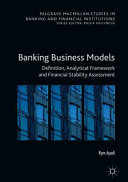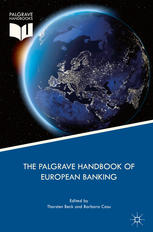Banking Business Models: Definition, Analytical Framework and Financial Stability Assessment
Springer International Publishing, 25th April, 2019
This book is a result of several years of research to provide readers with a novel and comprehensive analysis on business models in banking, essential to understanding bank businesses pre- and post- financial crisis and how they evolve in the financial system. This book will provide depositors, creditors, credit rating agencies, investors, regulators, supervisors, and other market participants with a comprehensive analytical framework and analysis to better understand the nature of risk attached to the bank business models and its contribution to systemic risk throughout the economic cycle. The book will also guide post-graduate students and researchers delving into this topic.
Institutional Diversity in Banking
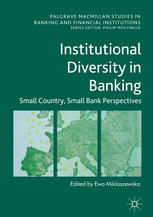 This book examines the evolution and current perspec- tives of primarily small banks with alternative structures that operate in all diversified financial markets. The chapters in the book emphasize the impact of the financial crisis on small banks and convey a similar mes- sage: that the small banks, mostly the cooperative sector, survived the cri- sis quite well, but have been directly and indirectly discriminated against in post-crisis restructuring; hence they face many operational and stra- tegic challenges today. The authors examine the diverse and often small institutions in the banking sector to see how they contribute to the broad picture of financial intermediation. In putting this book together, the editor sets out to provide a long overdue look at the two aspects of bank- ing diversity—size and organization—in the post-crisis era.
This book examines the evolution and current perspec- tives of primarily small banks with alternative structures that operate in all diversified financial markets. The chapters in the book emphasize the impact of the financial crisis on small banks and convey a similar mes- sage: that the small banks, mostly the cooperative sector, survived the cri- sis quite well, but have been directly and indirectly discriminated against in post-crisis restructuring; hence they face many operational and stra- tegic challenges today. The authors examine the diverse and often small institutions in the banking sector to see how they contribute to the broad picture of financial intermediation. In putting this book together, the editor sets out to provide a long overdue look at the two aspects of bank- ing diversity—size and organization—in the post-crisis era.
The Palgrave Handbook of European Banking
This Handbook aims to provide an understanding of the key issues facing European banks. The Handbook is composed of five main parts. Part 1, European Banking: Through the Crisis and Beyond, offers an overview of the European banking sector in terms of financial structure, ownership and business models and corporate governance, as well as the payment system. Part 2, Performance and Innovation in European Banking, discusses the key themes of bank competition, efficiency and performance. In addition, it looks at the impact of technological development on the banking sectors and how banks are embracing the opportunities it offers. Finally, it explores the issues of bank diversification and the relevance of small business lending.
Part 3, Financial Stability and Regulation, addresses the key issues of financial reforms and the increasing complexity of financial regulation. It also looks at the impact of state aid and the impact of monetary policy. Finally, it considers the increasing interactions between banks and markets. Part 4, Crossborder Banking, looks at recent trends in cross-border banking in Europe and evaluates the establishment of the Banking Union. Finally, Part 5, European Banking Systems, offers a detailed analysis of the main issues facing national banking system in key European banking markets.
Economic and Social Development of the Southern and Eastern Mediterranean Countries
Economic and Social Development of the Southern and Eastern Mediterranean Countries
(Springer), 10 November 2014
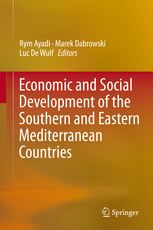 This book contains a unique collection of studies on key economic and social policy challenges faced by countries of the Southern and Eastern Mediterranean region in a short- and long-term perspective. Prepared within the EU funded FP7 project on „Prospective Analysis for the Mediterranean Region (MEDPRO)” conducted in 2010-2013 it takes account on recent political developments in the region (Arab Spring) and their potential consequences. It covers a broad spectrum of topics such as factors of economic growth, macroeconomic and fiscal stability, trade and investment, Euro-Mediterranean and intra-regional economic integration, private sector development and privatizations, infrastructure, tourism, agriculture, financial sector development, poverty and inequality, education, labor market and gender issues.
This book contains a unique collection of studies on key economic and social policy challenges faced by countries of the Southern and Eastern Mediterranean region in a short- and long-term perspective. Prepared within the EU funded FP7 project on „Prospective Analysis for the Mediterranean Region (MEDPRO)” conducted in 2010-2013 it takes account on recent political developments in the region (Arab Spring) and their potential consequences. It covers a broad spectrum of topics such as factors of economic growth, macroeconomic and fiscal stability, trade and investment, Euro-Mediterranean and intra-regional economic integration, private sector development and privatizations, infrastructure, tourism, agriculture, financial sector development, poverty and inequality, education, labor market and gender issues.
http://www.springer.com/economics/development/book/978-3-319-11121-6
The Oxford Handbook of Economic and Institutional Transparency
The Oxford Handbook of Economic and Institutional Transparency
(Oxford University Press), 09 October 2014

Edited by Jens Forssbaeck and Lars Oxelheim and published by Oxford University Press, the book forms one of the first reference works to survey existing research on transparency and explore its meaning and significance in different area; provides an up-to-date account of existing work on and approaches to transparency in economic research; and, contributions are authoritative, yet accessible and approach transparency from a range of disciplines.
Bridging the Gulf: EU-GCC Relations at a Crossroads
Bridging the Gulf: EU-GCC Relations at a Crossroads
IAI Research Papers, March 2014
 Relations between the European Union (EU) and the Gulf Cooperation Council (GCC) are at a crossroads. After the derailment of the negotiations for the Free Trade Agreement (FTA) in 2008, the cooperation between the two regional blocs has remained low-key in a number of different areas, while the unprecedented changes that have taken place in North Africa and the Middle East, the common neighbourhood of the EU and the GCC, have not led to a renewed, structured cooperation on foreign and security policy issues. This volume addresses the shortcomings and potential of EU-GCC relations by taking stock of their past evolution and by advancing policy recommendations as to how to revamp this strategic cooperation. In this light, it highlights the areas where greater room for manoeuvre exists in order to enhance EU-GCC relations, discusses the instruments available and sheds light on the feature of the regional and international context that are likely to significantly influence the new phase in the mutual relation between the two blocs. The book is the result of the research conducted in the framework of the project ‘Sharaka – Enhancing Understanding and Cooperation in EU-GCC Relations’, co-funded by the European Commission.
Relations between the European Union (EU) and the Gulf Cooperation Council (GCC) are at a crossroads. After the derailment of the negotiations for the Free Trade Agreement (FTA) in 2008, the cooperation between the two regional blocs has remained low-key in a number of different areas, while the unprecedented changes that have taken place in North Africa and the Middle East, the common neighbourhood of the EU and the GCC, have not led to a renewed, structured cooperation on foreign and security policy issues. This volume addresses the shortcomings and potential of EU-GCC relations by taking stock of their past evolution and by advancing policy recommendations as to how to revamp this strategic cooperation. In this light, it highlights the areas where greater room for manoeuvre exists in order to enhance EU-GCC relations, discusses the instruments available and sheds light on the feature of the regional and international context that are likely to significantly influence the new phase in the mutual relation between the two blocs. The book is the result of the research conducted in the framework of the project ‘Sharaka – Enhancing Understanding and Cooperation in EU-GCC Relations’, co-funded by the European Commission.
Monetary Policies, Banking Systems, Regulatory Convergence, Efficiency and Growth in the Mediterranean
Monetary Policies, Banking Systems, Regulatory Convergence, Efficiency and Growth in the Mediterranean
Palgrave, 12 December 2013
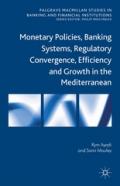 Published by Palgrave Macmillan, this book assesses the new challenges facing monetary policies and the independence of central banks in the Mediterranean. It explores regulatory convergence in banking and examines the impact of monetary policy and bank sector regulation on bank efficiency and economic growth in the Southern and Eastern
Published by Palgrave Macmillan, this book assesses the new challenges facing monetary policies and the independence of central banks in the Mediterranean. It explores regulatory convergence in banking and examines the impact of monetary policy and bank sector regulation on bank efficiency and economic growth in the Southern and Eastern
Click here for more information and to order the book:http://www.palgrave.com/products/title.aspx?pid=574010
Financial Centres in Europe: Post-Crisis Risks, Challenges and Opportunities
Financial Centres in Europe: Post-Crisis Risks, Challenges and Opportunities
(Palgrave Macmillan), 12 December 2013
 Published by Palgrave Macmillan, this book explores how financial centres in Europe have responded to the financial crisis and outlines the challenges and opportunities brought about by the increased international cooperation in regulation and taxation. This book has benefited from interviews with key players in banking, insurance, fund management, trust industry and regulators, tax authorities and others in the major financial centres in Europe during the financial crisis.
Published by Palgrave Macmillan, this book explores how financial centres in Europe have responded to the financial crisis and outlines the challenges and opportunities brought about by the increased international cooperation in regulation and taxation. This book has benefited from interviews with key players in banking, insurance, fund management, trust industry and regulators, tax authorities and others in the major financial centres in Europe during the financial crisis.
Click here for more information and order form:
Handbook of Safeguarding Global Financial Stability
Handbook of Safeguarding Global Financial Stability
(Academic Press), 29 November 2012
 The book explores the many forms of political and social forces exerting pressure on the globalised economy, from formal and informal policies to financial theories and technical models. The efforts to shape and direct these forces to preserve financial stability reveal much about the ways we perceive the financial economy. The Handbook of Safeguarding Global Financial Stability examines the political economy, particularly the ways in which these forces inhabit institutions, strategies, and tactics. As economies expand and contract, these forces also determine the ways we supervise and regulate. This high-level examination of the global political economy includes articles about specific countries, crises, and international systems as well as broad articles about major concepts and trends.
The book explores the many forms of political and social forces exerting pressure on the globalised economy, from formal and informal policies to financial theories and technical models. The efforts to shape and direct these forces to preserve financial stability reveal much about the ways we perceive the financial economy. The Handbook of Safeguarding Global Financial Stability examines the political economy, particularly the ways in which these forces inhabit institutions, strategies, and tactics. As economies expand and contract, these forces also determine the ways we supervise and regulate. This high-level examination of the global political economy includes articles about specific countries, crises, and international systems as well as broad articles about major concepts and trends.
Purchase the book at: http://store.elsevier.com/Handbook-of-Safeguarding-Global-Financial-Stability/isbn-9780123978752/
Chindia FDI in Africa: Implications for Europe and Re-polarization
Chindia FDI in Africa: Implications for Europe and Re-polarization
(World Scientific), August 2012
 At the end of the 1980s, a tri-polar world comprising the US, EU and Japan emerged. However, the economic turbulence of the early 21st century has destabilized this order, and the rise of other Asian powers has implications for the formation of a new economic configuration.
At the end of the 1980s, a tri-polar world comprising the US, EU and Japan emerged. However, the economic turbulence of the early 21st century has destabilized this order, and the rise of other Asian powers has implications for the formation of a new economic configuration.
This book discusses the probability of the different tentative global economic power balances to emerge, as well as the different contestants: the EU, China and Japan, among others.
Organized into three sections, the first part addresses general and trend-wise developments with relevance to the outcome of the re-polarization process. Subsequently, three chapters focus on developments in China, India and Japan. Finally, special issues such as climate policies, corporate governance, social reforms and cross-border economic alliances are considered in greater detail, in relation to their implications for the outcome of the re-polarization process.
Raj Aggarwal & Rym Ayadi contributed the chapter: “Chindia FDI in Africa: Implications for Europe and Re-polarization”
Research Handbook on International Banking and Governance
Research Handbook on International Banking and Governance
(Edward Elgar Publishing), 19 July 2012
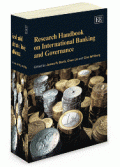 Edited by James R. Barth, Chen Lin and Clas Wihlborg and published by Edward Elgar Publishing, the book explores how regulation, legislation, politics and other factors influence the governance of financial institutions and their behavior in different dimensions. The contributors – top international scholars from finance, law and business – discuss market and policy features affecting the objectives and quality of governance.
Edited by James R. Barth, Chen Lin and Clas Wihlborg and published by Edward Elgar Publishing, the book explores how regulation, legislation, politics and other factors influence the governance of financial institutions and their behavior in different dimensions. The contributors – top international scholars from finance, law and business – discuss market and policy features affecting the objectives and quality of governance.
Purchase Information:
To order from N & S America: Edward Elgar Publishing Inc., PO Box 960, Herndon, VA 20172-0960 US
Tel: (800) 390-3149 • Fax: (413) 584-9933 Email: elgarsales@e-elgar.com
To order from the Rest of The World: Marston Book Services Limited
PO Box 269, Abingdon, Oxon OX14 4YN UK
Tel: + 44 1235 465500 • Fax: + 44 1235 465555 Email:direct.order@marston.co.uk
New Paradigms in Banking, Financial Markets and Regulation?
New Paradigms in Banking, Financial Markets and Regulation?
Published by Larcier, 24 May 2012
 On 11-12 May 2011, SUERF, the Belgian Financial Forum, the Brussels Finance Institute and the Centre for European Policy Studies (CEPS) jointly organised the 29th SUERF Colloquium on New Paradigms in Money and Finance. The papers included in this SUERF study are based on contributions to the Colloquium. The 2008-11 financial crisis has demonstrated unsatisfactory performance in financial institutions and in financial regulation and supervision all over the world. The contributors to the present volume look with critical eyes on financial theories, supervisory structures, (mis)pricing of risk and distorted incentives, risk management models and procedures, conflicts of interest and bank strategies. Their perspectives are quite different, but they share the ambition of finding improved analytical, organisational or managerial approaches so that decision-makers have a better chance of showing good performance in the future. In essence, they are looking for new paradigms in banking, financial markets and regulation.
On 11-12 May 2011, SUERF, the Belgian Financial Forum, the Brussels Finance Institute and the Centre for European Policy Studies (CEPS) jointly organised the 29th SUERF Colloquium on New Paradigms in Money and Finance. The papers included in this SUERF study are based on contributions to the Colloquium. The 2008-11 financial crisis has demonstrated unsatisfactory performance in financial institutions and in financial regulation and supervision all over the world. The contributors to the present volume look with critical eyes on financial theories, supervisory structures, (mis)pricing of risk and distorted incentives, risk management models and procedures, conflicts of interest and bank strategies. Their perspectives are quite different, but they share the ambition of finding improved analytical, organisational or managerial approaches so that decision-makers have a better chance of showing good performance in the future. In essence, they are looking for new paradigms in banking, financial markets and regulation.
Download book at: http://www.suerf.org/download/studies/study20122.pdf
Crisis Management at Crossroads: Challenges facing cross border financial institutions at the EU level
Crisis Management at Crossroads: Challenges facing cross border financial institutions at the EU level
(Larcier), 19 March 2010
 This book is the outcome of a high level conference co-organised by CEPS, SUERF (European Money and Finance Forum) and the Belgian Financial Forum in November 2009 in Brussels. The papers focus on key challenges of crisis management of cross border financial institutions at the EU level The book addresses topics ranging from the collapse of the Icelandic banking sector, cross-border banking resolution and deposit guarantee schemes, while also examining the crisis management approaches of the European Central Bank and other lenders of last resort.
This book is the outcome of a high level conference co-organised by CEPS, SUERF (European Money and Finance Forum) and the Belgian Financial Forum in November 2009 in Brussels. The papers focus on key challenges of crisis management of cross border financial institutions at the EU level The book addresses topics ranging from the collapse of the Icelandic banking sector, cross-border banking resolution and deposit guarantee schemes, while also examining the crisis management approaches of the European Central Bank and other lenders of last resort.
The volume concludes with the 2009 SUERF Annual Lecture on “Unconventional Monetary Policies and Crisis Management” delivered by Jaime Caruana, General Manager of the International Bank for Settlements.
Download book
Printed copies may be ordered from CEPS at €12/each.
Financial Innovation In Retail And Corporate Banking
Financial Innovation In Retail And Corporate Banking
Edward Elgar Publishing
 This valuable book discusses in detail, through a blend of theory and empirical research, the processes of innovation and the diffusion of new financial instruments.
This valuable book discusses in detail, through a blend of theory and empirical research, the processes of innovation and the diffusion of new financial instruments.
The contributors explore theoretical issues such as the relationship between financial innovation and market structure and the legal protection of financial innovation. They examine various topics on retail banking, from payment services and procedures, trading online, internet banking and profitability of retail banking to microfinance. This comprehensive book also focuses on innovation in corporate banking, such as credit derivatives and their implications for the relationship between banks and markets in financial systems.
This book will be invaluable to postgraduate students, researchers and academics with an interest in economics and finance and financial innovation in particular.
Frontiers of Banks in a Global Economy
Frontiers of Banks in a Global Economy
(Palgrave Macmillan), December 2007
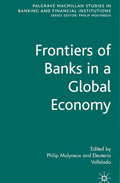 In today’s globalized economy, banking is of high international importance. This book brings together topical issues in banking such as reform in China, electronic money and loan pricing, and highlights key policy and research in the field. The contributions from International experts provide insights into contemporary global banking trends including studies on: the impact of M&A in European and Asian banking, Basel 2 and loan pricing, microfinance, financial services for migrants, bank efficiency, lending behavior of European banks and the impact of new technology in banking.
In today’s globalized economy, banking is of high international importance. This book brings together topical issues in banking such as reform in China, electronic money and loan pricing, and highlights key policy and research in the field. The contributions from International experts provide insights into contemporary global banking trends including studies on: the impact of M&A in European and Asian banking, Basel 2 and loan pricing, microfinance, financial services for migrants, bank efficiency, lending behavior of European banks and the impact of new technology in banking.
With its extensive coverage of today’s global banking issues, this book will be of interest to students, researchers and professional bankers alike.

